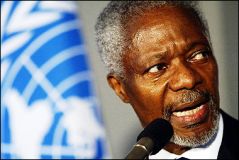Annan: Sudanese government fails to meet two key U.N. demands
By EDITH M. LEDERER, Associated Press Writer
UNITED NATIONS, Feb 08, 2005 (AP) — The Sudanese government has failed to meet the two most important demands of the U.N. Security Council — disarm militias and arrest those responsible for attacks on civilians in Darfur which have recently intensified, Secretary-General Kofi Annan said in a report.
 Over the last six months, fighting in western Darfur involving government forces, Arab militiamen known as Janjaweed who back them, and other armed movements has continued and banditry and abductions have dramatically increased, Annan said in the report released Monday.
Over the last six months, fighting in western Darfur involving government forces, Arab militiamen known as Janjaweed who back them, and other armed movements has continued and banditry and abductions have dramatically increased, Annan said in the report released Monday.
The secretary-general said the result has been an increase in the number of civilians affected by the conflict to 2.3 million, more than one-third of the estimated population in Darfur of 6 million before violence erupted two years ago. At least 70,000 people have died.
Annan’s grim report outlining key commitments not kept by the government, more attacks and less cooperation by rebel movements in political talks to resolve the conflict, and increasing threats to humanitarian workers was released on the eve of a Security Council meeting focusing on Sudan.
Sudan’s first vice president, Ali Osman Mohammed Taha, and John Garang, head of the Sudan People’s Liberation Movement, who last month signed a peace deal ending the 21-year civil war in southern Sudan, are scheduled to brief the council at an open meeting Tuesday along with Baba Gana Kingibe, the African Union envoy in Sudan.
Annan told reporters “it will be important” to have the parties in New York to discuss “the action they need to take on the ground to make it really hold.”
“We also believe that the implementation … will have a positive impact … on the settlement of Darfur,” he said.
Annan has asked the council to approve a 10,130-strong U.N. peacekeeping mission to enforce the north-south peace deal but he stressed again Monday that efforts to monitor and verify the Jan. 9 agreement must include the Darfur crisis.
The U.N. mission envisioned by Annan would help address “the root causes of conflict in the whole of Sudan and in facilitating the establishment of durable peace country-wide.”
“Peace in Sudan is indivisible and so should be the efforts to facilitate it,” the secretary-general said.
The Security Council is expected to start discussing a draft resolution to address Annan’s request for the peacekeeping mission shortly. It is also expected to take up a report last week by a U.N.-appointed commission which found evidence of crimes against humanity and war crimes in Darfur, but stopped short of labeling the crisis genocide.
It wasn’t known whether that resolution would also address ways of punishing those responsible for crimes in Darfur or other ways to stop the violence there.
Council members are considering sanctions, an arms or oil embargo, and referrals to a war crimes tribunal. Many back the report’s recommendation to present cases to the International Criminal Court but the United States vehemently opposes the world’s first permanent war crimes tribunal and is pressing instead for alleged perpetrators to be tried at a tribunal based in Arusha, Tanzania.
A senior U.S. official, speaking on condition of anonymity, said the United States is prepared “to shoulder a very large part” of the financial cost of a tribunal at Arusha, where leaders allegedly responsible for the 1994 Rwanda genocide are currently being prosecuted.
But Taha said Saturday that the Sudanese government will not send Sudanese citizens or officials suspected of Darfur war crimes charges to any international court.
The commission recommended that 51 Sudanese people — including high-ranking government officials, rebels and Arab militiamen known as the Janjaweed — stand trial at the International Criminal Court.
The U.S. official, asked whether Taha was on the list, said Washington didn’t have any information about names and was focusing on trying to resolve the Darfur conflict and promote a new round of political talks in Abuja, Nigeria.
Annan’s report said the government has made “little progress” in meeting its U.N. obligation to adopt measures to end impunity, investigate reports of human rights violations, and ensure that those accused of abuse are brought to justice without delay.
Since September, it said, there also has been no evidence of disarmament as the government promised.
“Disarmament and arrest of the perpetrators of these brutal acts is the single most important demand of the council and the clearest case of failure by the government to live up to its responsibilities,” the report said.
